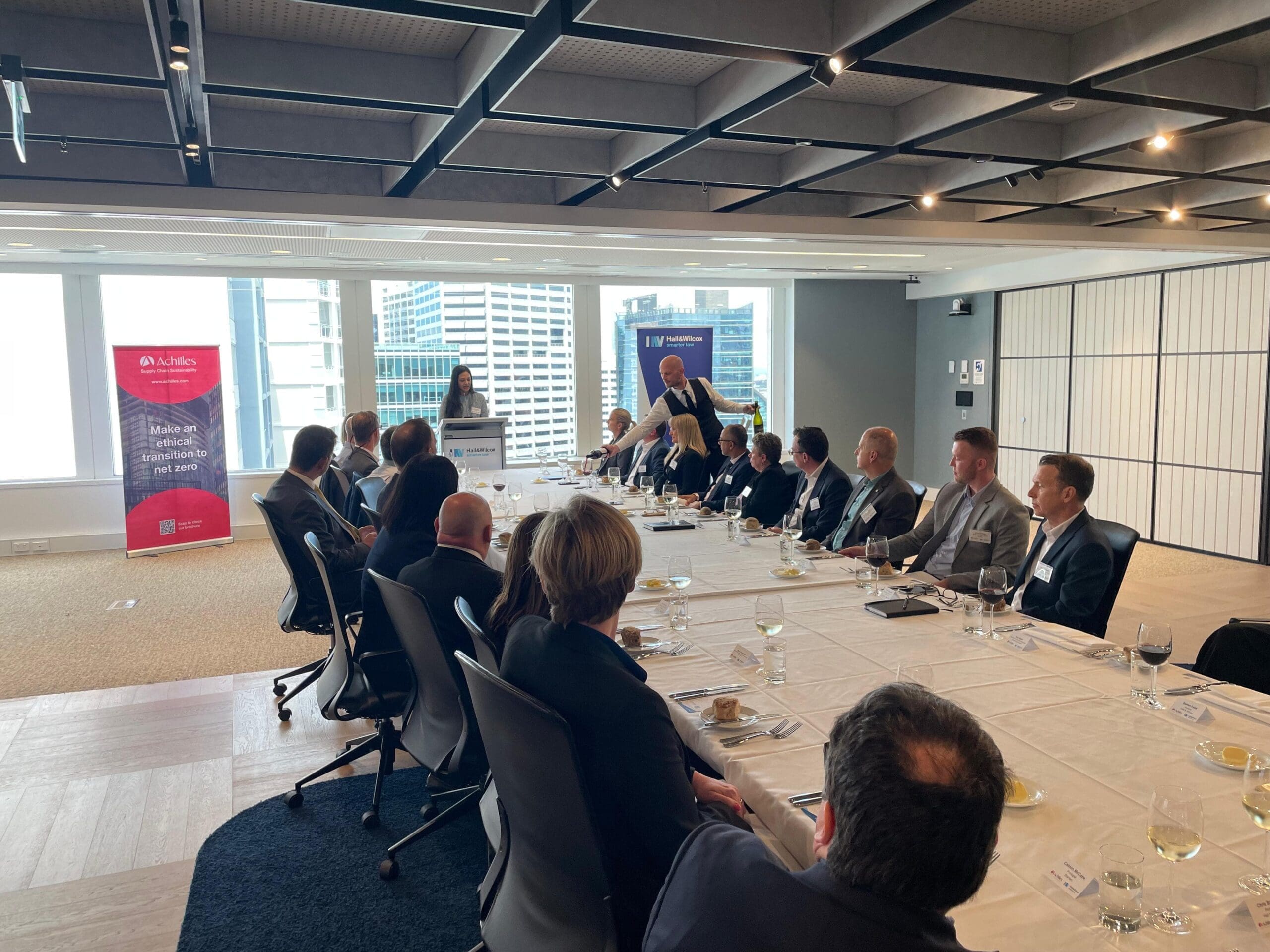The Hall and Wilcox and Achilles Boardroom Lunch Round Table to discuss Delivering Sustainability in the Australian Construction Industry was held on 18 October 2023 at the Hall and Wilcox offices located at Darling Harbour, Sydney.
Event Purpose
The drive to net zero presents a huge opportunity for the construction sector in delivering a just transition. Alongside the focus on buildings and infrastructure to support a more sustainable future, there is also increasing focus on people too – prioritizing human rights, including the prevention of modern slavery, child labour and workforce wellbeing.
The purpose of the roundtable was to discuss what these changes mean for construction companies as they look to the future and how might cross-sector collaboration enable the industry to deliver on its sustainability goals more efficiently and effectively.
Roundtable guests
The event was well attended by 26 specially invited guests representing leading Australian construction companies as well as Dr. James Cockayne, the Anti-Slavery Commissioner for New South Wales and members of the Hall and Wilcox and Achilles team of environmental social governance experts.
Construction companies that joined us for the event included:
- Boral Ltd
- Lendlease
- GPT Group
- Honeywell
- Hutchinson Builders
- JLL
- Laing O’Rourke
- Mirvac
- Mott MacDonald
- PICA Group
- Stantec
- Stockland
Discussion points
The event was opened by Stefan Fenk from Hall &Wilcox who set the scene for the next two hours. He was followed by Smitha Shetty from Achilles who talked about the increasing importance of supply chain transparency for businesses globally.
The round table discussion broadened from modern slavery to include sustainability, ESG, health and safety and discussed issues including:
- How the introduction of Australia’s modern slavery laws has and continues to impact the construction sector.
- How sustainability regulation is evolving in Australia and what that means for construction businesses.
- What Australian construction companies can learn from international counterparts.
- What constitutes doing “enough” when it comes to combating the issue of human exploitation.
- How companies are integrating ESG standards into their business strategies and the associated risks and opportunities.
- The different business challenges associated with managing supply chain risk and ways to overcome these.
A particular highlight of the lunch was the keynote address from our Special Guest: Dr. James Cockayne, the Anti-Slavery Commissioner for New South Wales.
The Commissioner is independent of political affiliation and reports directly to the NSW parliament. Dr Cockayne proved to be an inspirational speaker and a master of his brief. His rough assessment is that there are at least 41,000 people subjected to modern slavery in Australia, 16,000 of whom are estimated to be in New South Wales alone, which represents around 0.2% of the population of the State.
Concerningly, only 20% of modern slavery victims are estimated to report their dire circumstances. This suggests the actual number could be much higher than current estimates.
Although, despite these numbers, Australia is categorized as low risk in terms of modern slavery, Dr. Cockayne also emphasized the importance of taking a global perspective. The International Labour Organisation (ILO) data suggests that global construction supply chains affect an estimated 40 million individuals worldwide and the purchasing decisions made within construction sectors the world over hold power. We all have a collective responsibility for understanding the implications of what we are potentially participating in.
Dr. Cockayne also drew attention to the risks associated with solar panels, particularly those linked to Xinjiang’s forced labour camps and the significant reliance on polysilicon from the region.
Following the keynote, an interactive discussion took place. The solar panel topic was deeply explored by our guests – in particular how to address the challenges of finding sustainable, cost-effective alternatives to Chinese-made SPVs.
Throughout the event, there was a recurring theme of the importance of collaboration. Whether it was to overcome resource constraints and expertise gaps, or to take advantage of the benefits of collective purchasing, working together as in an industry was widely agreed to be as the way forward.
Paul Stanley, Achilles CEO, wrapped up the session, commending the progress made by key stakeholders coming together for this first event. He also spoke of his pride in the work done at Achilles to help eliminate slavery and other human rights abuses in the global supply chain.
Overall, the session was a powerful reminder of the challenges ahead and the collective effort required to combat modern day slavery, especially in industries as vast and complex as construction.


